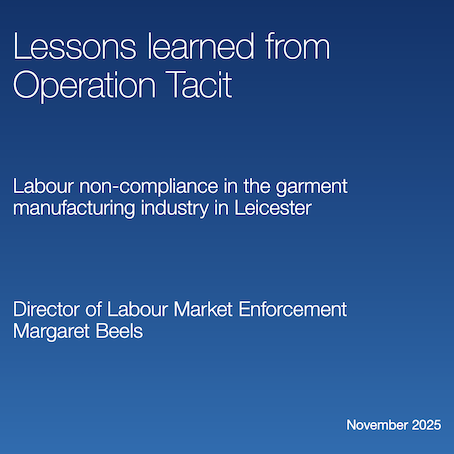Workers’ Rights Abuse in Leicester ‘Overexaggerated’ Official Review Reveals

10-11-2025
The long-awaited Lessons Learned from Operation Tacit report, presented to Parliament by Director of Labour Market Enforcement Margaret Beels, has found that claims of widespread worker exploitation and “modern slavery” in Leicester’s garment industry were significantly overstated.
The comprehensive review, published under Section 5(1)(b) of the Immigration Act 2016, examined the outcomes of Operation Tacit — the largest multi-agency investigation ever conducted into alleged labour non-compliance in the UK. The operation brought together more than ten government and enforcement bodies, including HMRC, the Gangmasters and Labour Abuse Authority (GLAA), the Health and Safety Executive and Leicester City Council.
No Evidence of Modern Slavery
Beels’ report makes clear that, while isolated breaches of labour law were identified, there was no evidence of prosecutable offences of modern slavery or forced labour.
“Investigations by enforcement bodies with powers and expertise found no evidence of prosecutable offences,” the report states. The National Crime Agency (NCA) similarly concluded that while some non-compliance existed, “it is highly likely the industry only contains a small number of modern slavery or human trafficking victims,” suggesting that the scale of abuse was at the lower end of the spectrum.
The Director warned that the use of “modern slavery” language to describe broader workplace issues may have been misleading:
“Using the language of modern slavery could have had a negative impact on the industry… allegations risked the deployment of the wrong resources and gave workers a sense that their concerns were being downplayed.”
Non-Compliance Lower Than Other Manufacturing Sectors
The review found that Leicester’s garment manufacturers generally demonstrated lower levels of non-compliance with minimum wage laws than other parts of the UK manufacturing sector.
“The overall findings of Operation Tacit were that the degree of non-compliance with the National Minimum Wage in Leicester’s garment sector was lower than in other manufacturing,” the report confirmed.
While the investigation acknowledged examples of poor practices such as underpayment and weak record-keeping, these did not meet the legal threshold for forced or compulsory labour under the Modern Slavery Act 2015.
Consequences of Overblown Allegations
Industry leaders have welcomed the report’s publication, describing it as a long-overdue “myth buster” for Leicester’s embattled garment sector.
Fashion-Enter Ltd founder and Chair of the Apparel and Textile Manufacturers Federation (ATMF) Jenny Holloway said the findings vindicate local businesses that had suffered reputational and commercial harm due to sensationalised media coverage:
“The untold harm of inflammatory rhetoric in press and TV documentaries has resulted in retailers and brands leaving Leicester with concerns of reputational damage. Now the evidence is here for all to review.”
She added: “These are hardworking, skilled, ethical factories that have been penalised unnecessarily – they are owed an apology.”
Revitalising Leicester’s Manufacturing Future
The report also calls for renewed efforts to build a sustainable, high-value garment industry in Leicester, recommending the revitalisation of the Leicester Labour Market Partnership and continued local initiatives such as the Leicester Fashion Technology Academy and FAB-L (Fashion Advice Bureau – Leicester).
Beels emphasised that creating a thriving and compliant industry requires collaboration across government, business, and community groups. She proposed the Garment and Textile Workers Trust convene a summit to secure long-term funding for worker support initiatives.
A Call for National Support
Industry representatives are now urging government and major retailers to back British manufacturing by supporting Leicester-based producers through public procurement contracts and fair supply chain practices.
“Let the Labour Party now recognise the might of UK manufacturers,” said the ATMF Chair. “Support us with public procurement for PPE and uniforms and let’s move forward to rebuild confidence in Made in the UK manufacturing.”
A Turning Point
After years of scrutiny, Lessons Learned from Operation Tacit offers a balanced, evidence-based view of Leicester’s garment sector confirming that while some issues remain, the narrative of widespread abuse was exaggerated.
As Beels concluded, the focus must now shift from blame to building a sustainable, ethical, and proudly British garment industry:
“There are useful initiatives underway to support the growth of a compliant garment industry in Leicester and these need to be encouraged.”























